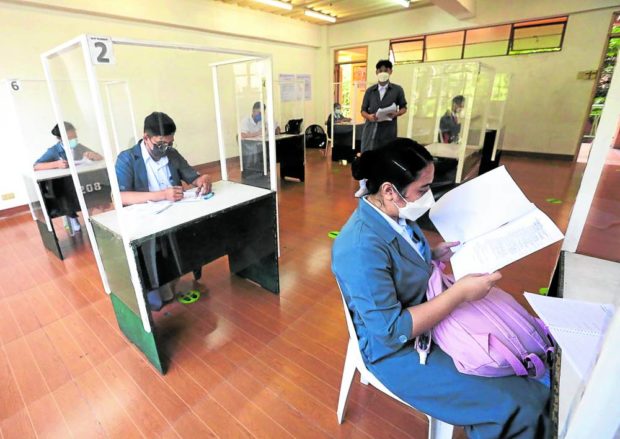
EARLIER SETUP | Classrooms looked like this in November 2021 for nursing students at Universidad de Manila, which was among the first to try limited in-person classes at the college level. On Friday, March 11, 2022, the government finally allowed higher education institutions to accept students at 100-percent capacity. (MARIANNE BERMUDEZ / Philippine Daily Inquirer)
MANILA, Philippines — Most of the presidential candidates vowed during the “PiliPinas Debates” on Saturday to push for more funding for schools to revitalize education, which for the past two years had to be conducted online due to the COVID-19 pandemic.
All of the candidates, except former Sen. Ferdinand Marcos Jr., attended the event hosted by the Commission on Elections (Comelec).
Vice President Leni Robredo said the government should probably declare an education crisis — as she previously suggested.
“We need, first of all, to fix the quality of our education so that our graduates will be prepared for the job that they would want to pursue,” she said, speaking in a mix of Filipino and English. “Even during pre-pandemic, we already had a big problem with the quality of education. In fact, if we look at our rankings, at international assessments, we are always at the bottom.”
“I have always said this: We need to declare an education crisis so that we can focus on this. Let’s raise our budget for education. Unesco has a recommendation of up to 6 percent. Right now, it’s only 3 percent of our budget. Let’s raise it to 6 percent.”
Sen. Manny Pacquiao said the government could strengthen the Technical Education and Skills Development Authority (Tesda). It’s the primary agency tasked with giving training for students or graduates who feel that their education is lacking.
“Why don’t we strengthen Tesda and let it train those who were not able to finish their studies but would like to learn,” he said. “We can support this. This is such a big thing.”
Manila Mayor Isko Moreno said he saw no problem with aiming for a better education system. However, he would prefer to transform agricultural programs into a lucrative industry so that the country could attain food self-sufficiency.
“If there’s a need for our graduates to catch up on lost opportunities, then so be it. We’ll invest in it,” he said. “ But let’s move on towards our goal for our countrymen — that become competitive in the world.”
“Going around the country, I saw the hardships of farmers in giving us food. So what I’ll do — under S-T-E-A-M — A for agriculture, we will invest some money. We will invest. This pandemic has already taught us to be careful and to produce our own food and not be dependent on imported goods, products because we don’t know what will happen in the fighting between two countries. We have to be food sufficient.”
He was referring to the Russia-Ukraine war. STEAM is his acronym for science, technology, education, agriculture, and mathematics.
Sen. Panfilo Lacson said the government should do everything to allow businesses and even schools to operate normally.
“Let’s hurry up the transition from a state of pandemic to endemic… I support the position of the NEDA [National Economic and Development Authority] that we should lower to Alert Level 1 areas all over the Philippines so that our countrymen can return to their jobs,” he said.
“‘For the medium term, we have the skills matching that will make it easier to get a job. We can only do this when we have digitized our government processes and transaction. How can we digitalize? We need to improve our internet service. We need to fund the national broadband highway,” he added.
Last July 2021, an assessment headed by the World Bank stated that 80 percent of children in the Philippines did not know what they need to know — meaning that a lot of Grade 5 students did not have the reading and mathematical skills expected of those in the Grade 2 or Grade 3.
Across three assessments, the country was observed to have poor learning results among students.
In fact, the Philippines performed more poorly compared to almost all other participating countries in the Program for International Student Assessment (Pisa), ranking either at or near the bottom in each learning area assessed.
In science and math, the Philippines was second to the last among 78 countries within the Pisa study, while it was dead last in reading; with the Trends in International Mathematics and Science Study (TIMSS) study, the country was last in both math and science among 58 countries.
The Department of Education said it was challenged by the report and vowed to address the issues mentioned in the assessment.
But aside from allocating funds into the education sector, Robredo believes that the government and educational institutions also need to lessen the workload of teachers so that they could focus on producing good students.
“The salaries of teachers are not competitive with those in our places. We are drowning them in a lot of administrative work when they should focus on instruction. Their training should be continuous so that they can produce students of better quality,” she said.
But Sen. Manny Pacquiao believed that teachers would not actually pass students if they were really failing subjects. He added that the problem was not the lack of skills but the lack of jobs.
“If the issue is the ability of our graduates, of our students, that cannot be questioned. I don’t think teachers would pass them if they are able to [perform], if they did not really pass,” he said.
“The ability of the Filipino is unique. The real problem, the biggest issue here is: Will they be able to find jobs? What jobs can they get into? That’s the problem of our country. If all we need is Filipino workers, we have more than enough. What we need are jobs,” he added.